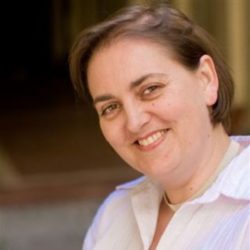IMC Memories: Nada Zečević
Nada Zečević (Royal Holloway, University of London) attended her first IMC in 2002. We spoke to her about the impact it has had on her career.
My research history is a little unusual compared to many Western European scholars. I’m from Bosnia-Hercegovina. Unfortunately, near the end of my studies the war of the late 1990s began, and my career was very much affected. I did additional studies and ended up being a post-Byzantinist late medieval historian.

Nada Zečević (Royal Holloway, University of London) attended her first IMC in 2002. We spoke to her about the impact it has had on her career.
When I received an IMC bursary in 2002 I was finishing my PhD research. I was a young junior scholar from the Balkans. The war meant our institutions couldn’t properly support us to travel to share our ideas. Attending the IMC was very important for me to present my research, but it also allowed me to become more visible, especially coming from that region. It was very helpful and useful and I remember it as a very important step for me and my career.
Professionally, the IMC has had a huge impact in that it allows me to get quick regular updates about theory and research, which are moving very fast in some parts of the world. It’s also helped me to compare where I have been standing at various points in my research. If you come back almost every year, it’s easy to make these comparisons in the sessions and discussions. The IMC allowed me academic visibility that I wouldn’t have had without such an event, and personally, it allowed me a very great network of colleagues and connections I was able to create and maintain. I probably wouldn’t have been able to do so if I hadn’t been here.
As an individual, the IMC has definitely helped me to enjoy myself. Medieval studies is more than just history. When I compare myself now at the IMC after so many years, whenever I think about the medieval past, it’s really about various aspects of this: having fun with colleagues, tasting medieval food and wine, dancing a little bit! It did have quite an interesting personal impact. Some members of my family like to accompany me, especially the junior ones – so I have to say the IMC has contributed to their education, because they learned something here as well.
There’s always the possibility of interacting with colleagues to discuss our progress, and also making networks which are very efficient. I have to say this because my current fellowship is the outcome of one such network, created within the frame of the IMC at Leeds. So the fact that I’m here now at Royal Holloway is very much due to networking that was done there. It’s a network we don’t have chance to create and maintain anywhere else: a more extensive, interdisciplinary, and truly international network.
I also had the opportunity to compare Bodington Hall with the new site in the centre of Leeds. It’s more convenient and gives you the feeling of a community that’s active and engaged around the event. And it’s within the city, so it’s not like you’re isolated. It’s very much embedded into the space of the city, so the memories of the IMC are the memories of Leeds as well.
